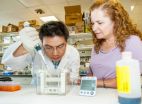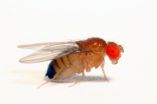(Press-News.org) (Edmonton) Male partners of breast cancer patients are likely to take a pass on spousal support groups in favour of exercise or an evening out with friends to cope with stresses associated with the disease, according to new research from the University of Alberta.
Faculty of Nursing professor Wendy Duggleby said spouses of women with breast cancer have unique needs when it comes to retaining a sense of hope at a time when they provide important physical and emotional support for their partners.
"There are many programs out there for women, but for men a lot of support mechanisms are support groups, and it was very clear from the participants in our study that's not what they wanted," said Duggleby, Endowed Nursing Research Chair in Aging and Quality of Life.
"What these spouses needed was help finding ways to do things for themselves to help reduce their stress."
The study, published in this month's Oncology Nursing Forum, is the first to look at the hope experience of male spouses of breast cancer patients, said Duggleby. Ensuring men have a sense of hope not only helps decrease their risk for depression, it helps their partners, too.
"If their husbands lose hope, the wives are really, really worried about them and they often lose hope themselves. For women with breast cancer, it actually helps with their own quality of life if we can do something to help the men. It's very interconnected."
In the study, men in Edmonton and Saskatoon were surveyed about hope and their ability to cope with their spouses' disease. Many reported that their partner's diagnosis was their darkest day, and that they struggled to find hope and balance after juggling career, added household duties and care.
Fighting back
Warren Tasker called upon a fighter's will when his partner Gwen Borowski was diagnosed with breast cancer on March 1, 2007. He made Borowski's needs a priority and together they put everything toward the fight, learning all they could about the disease and pressing physicians to explain treatment in detail.
"It was all I thought about, night and day," said Tasker, an Edmonton-based writer and editor, who wrote about the experience for the Canadian Breast Cancer Foundation – Prairies/NWT chapter.
After years of writing about boxing for the Edmonton Journal, he took up the sport to cope with stress, in addition to his regular running and cycling routine.
"I was getting hit and I was getting to hit back. It felt good—it felt really good," he said. "You need an outlet, you need to find something to release all the pent-up frustration, the fear, the apprehension, the anxiety."
In study interviews, filmed and posted online, spouses reported similar experiences, turning to exercise, music, hobbies and time away with friends to find balance. Many expressed a strong desire to be able to talk to or hear from other spouses who went through similar struggles—without taking time from work or family to attend support groups, Duggleby said.
Work schedules also presented challenges with attending medical appointments with their spouses to hear information first-hand, which was another strong need spouses expressed.
"If you're a working man, it becomes difficult to go to some appointments, although some of that is just perception. They're not being excluded but they feel like they're being excluded. It's part of breaking down some of those barriers in cancer care," said Duggleby.
Duggleby said the findings should help health-care providers and agencies provide the specific support and resources these men need. For many spouses, an easy solution would be a guide showing where to find online information about breast cancer without information overload.
"They really do want something that's specific for them, tailored for their needs. It doesn't have to be done through a research study. There is a lot that can be done just based on what these spouses said and the ideas they provided. It would make a huge, huge difference."
###The study was funded by the Canadian Breast Cancer Foundation – Prairies/NWT.
Spouses of breast cancer survivors hold on to hope
2012-08-01
ELSE PRESS RELEASES FROM THIS DATE:
Black gay men worldwide 15 times more likely to have HIV and racial disparity
2012-08-01
ATLANTA – An international team of researchers, including a scientist at Georgia State University, found that black men who have sex with men (MSM) are more likely to have HIV than other MSM, and that social inequalities play a major role.
Examining data from nearly 200 studies in the U.S., the United Kingdom and Canada, the researchers found that stigma, poverty and inadequate access to health care were major factors in the disparities. The term "MSM" was used in the study, as some men who have sex with men do not identify with the terms gay or bisexual.
The results ...
Research: Men respond negatively to depictions of 'ideal masculinity' in ads
2012-08-01
CHAMPAIGN, Ill. – The male response to depictions of ideal masculinity in advertising is typically negative, which has implications for advertisers and marketers targeting the increasingly fragmented consumer demographic, according to research from a University of Illinois marketing expert.
Cele Otnes, a professor of advertising and of business administration who studies how marketing and advertising shapes consumption, says that men who compare themselves to the hyper-masculine or over-exaggerated male stereotypes in advertising and popular culture experience a range ...
New research reveals extent of poor-quality antimalarial medicines in South American countries
2012-08-01
Rockville, Md., August 1, 2012 — Two articles recently published in Malaria Journal shed new light on the quality of antimalarial medicines circulating in countries in the Amazon Basin in South America. Researchers from the Promoting the Quality of Medicines (PQM) program, a cooperative agreement between the U.S. Agency for International Development (USAID) and the U.S. Pharmacopeial Convention (USP), in conjunction with country partners, coordinated these studies in the context of the Amazon Malaria Initiative (AMI).
"Though several studies in recent years have assessed ...
Obese donors increase risk of death for pediatric liver transplant recipients
2012-08-01
Children undergoing liver transplantation are at greater risk of graft loss and death from adult organ donors who are severely obese according to research published in the August issue of Liver Transplantation, a journal of the American Association for the Study of Liver Diseases. The study, funded in part by a grant from the National Institutes of Health (NIH), found that pediatric donor body mass index (BMI) did not increase mortality risk in this pediatric population.
Obesity is a global health concern. A 2008 report from the World Health Organization (WHO) estimates ...
13-year Cascadia study complete – and Northwest earthquake risk looms large
2012-08-01
CORVALLIS, Ore. – A comprehensive analysis of the Cascadia Subduction Zone off the Pacific Northwest coast confirms that the region has had numerous earthquakes over the past 10,000 years, and suggests that the southern Oregon coast may be most vulnerable based on recurrence frequency.
Written by researchers at Oregon State University, and published online by the U.S. Geological Survey, the study concludes that there is a 40 percent chance of a major earthquake in the Coos Bay, Ore., region during the next 50 years. And that earthquake could approach the intensity of ...
Researchers find potential cancer roadblock
2012-08-01
EAST LANSING, Mich. — By identifying a key protein that tells certain breast cancer cells when and how to move, researchers at Michigan State University hope to better understand the process by which breast cancer spreads, or metastasizes.
When breast cancer metastasizes, cancer cells break away from a primary tumor and move to other organs in the body, including the lungs, liver and brain. In work published recently in the journal Cancer Research, MSU researchers Kathy Gallo and Jian Chen show a protein called MLK3 (mixed lineage kinase 3) is a critical driver of breast ...
More code cracking
2012-08-01
A trio of groundbreaking publications from researchers in Northwestern University's Physical Sciences-Oncology Center (PS-OC) report important methodological advances that will enable a better understanding of how gene expression is regulated, both in normal cells and in cancer cells. This knowledge could lead to the development of more effective therapeutic agents to treat cancer patients.
The three papers, published recently in the journals Nature Genetics, Nature Biotechnology and Nature, focus on nucleosomes, a basic unit of DNA packaging, and may help to uncover ...
New study: Running mechanics, not metabolism, are the key to performance for elite sprinters
2012-08-01
Sprinters competing in the 2012 Olympics might assume their championship performance is the result of their fuel-efficient physiology.
But a new study disproves the classic scientific view that conserving energy maximizes performance in a sprinting event.
The study by biomechanics researchers Matthew W. Bundle at the University of Montana and Peter G. Weyand at Southern Methodist University, Dallas, demonstrates that metabolic economy is not an important factor for performance in events lasting 60 seconds or less.
In fact, just the opposite is true.
"That prevailing ...
In fly DNA, the footprint of a fly virus
2012-08-01
BUFFALO, N.Y. -- In a curious evolutionary twist, several species of a commonly studied fruit fly appear to have incorporated genetic material from a virus into their genomes, according to new research by University at Buffalo biologists.
The study found that several types of fruit fly -- scientific name Drosophila -- harbored genes similar to those that code for the sigma virus, a fly virus in the same family as rabies. The authors believe the genetic information was acquired during past viral infections and passed on from fruit fly parent to offspring through many generations.
The ...
State of Michigan adopts NIH's PRB progesterone therapy to combat infant mortality
2012-08-01
DETROIT — The Michigan Department of Community Health (MDCH) has unveiled the state's Infant Mortality Reduction Plan, a strategy that includes significant recommendations developed from medical research conducted by the Perinatology Research Branch (PRB) of the Eunice Kennedy Shriver National Institute for Child Health and Human Development, National Institutes of Health (NICHD/NIH), at the Wayne State University School of Medicine.
Announced Aug. 1, the plan promotes the adoption of universal cervical length screening by ultrasound and the use of progesterone in women ...


